STRINDBERG ON PROZAC
Throughout my tenure with Stage and Cinema I have criticized a number of productions for staging foreign plays too literally, insisting that it is misguided for directors who don’t have sufficient understanding of the world the playwright is working with to try and recreate it – better to reinvent it as something wholly one’s own.
So when I learned that the August Strindberg Repertory Theatre was reimagining Strindberg’s To Damascus as taking place in the Harlem of 1962, I was intrigued. The music, the language, the characters, the costumes – oh what colorful fantasies I had in my mind of a production set in such a vibrant and evocative mythological locale. And oh what an utter disappointment it turned out to be.
At two hours and fifteen minutes (not counting a 15 minute intermission), To Damascus, the first play in Strindberg’s trilogy (also known as The Road to Damascus), tells of a Stranger (DeSean Stokes) who, having abandoned his wife and two children, arrives in a city – in this case Harlem – hooks up with a married Lady (Kersti Bryan), and embarks with her on a sort of spiritual, emotional, psychological and temporal odyssey.
On their journey they encounter a Beggar (Nathan James), visit the Lady’s cuckolded husband, the Doctor (Victor Arnez) who lives with his Sister (Carol Carter), and go see the Lady’s Mother (Victoria Blankenship) and Grandfather (Allen Kennedy). The play itself is profound, full of mystery and allegory, fascinating characters, substantial themes, and a universe of subtext. Robert Greer’s staging, unfortunately, captures none of this.
Except for two allusions to the fact that the action is taking place in 1962 Harlem there is nothing of Harlem or of 1962 in the show (not counting brief snippets of Blues during scene changes). Perhaps the idea that this story happens then and there has some significance for Mr. Greer. But a director’s job is to create worlds, not wallow in in-jokes, and Mr. Greer does next to nothing to evoke that time and place.
The language spoken in To Damascus sounds like a literary English translation of the Swedish original. No attempt is made to colloquialize it. This would have been fine were this story taking place in the city of X in year Y. But it’s supposed to be 1962 Harlem, USA. The literary language might have been called a stylistic choice if 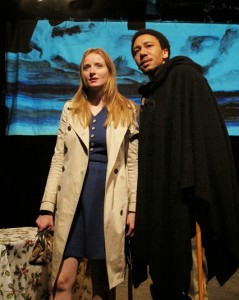 there was anything else in the production to support that. But there isn’t. As a result it just feels lazy. Another issue is that almost nothing is made of the fact that the Lady is white while the Stranger (her lover) and the Doctor (her husband) are black during the most racially volatile time in 20th century America.
there was anything else in the production to support that. But there isn’t. As a result it just feels lazy. Another issue is that almost nothing is made of the fact that the Lady is white while the Stranger (her lover) and the Doctor (her husband) are black during the most racially volatile time in 20th century America.
But these failings are trifles compared to how poor a job Mr. Greer does dissecting the script and directing his cast. With a few minor exceptions the performances feel more like actors doing script readings than playing characters. The renditions are unmoving and all drama falls flat. Subtext and nuance are nonexistent. Something like this might work better in Radio Theater; I know when I’d close my eyes and my imagination filled in what my eyes did not see I’d find the show noticeably more enjoyable. But I’d have to open them quickly to not fall asleep, as this production has the energy of an old waiting room.
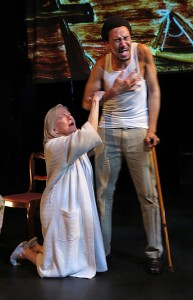 photos by Ina Stinus, Claire Taddei,
photos by Ina Stinus, Claire Taddei,
and Jonathan Slaff
To Damascus, Part I
August Strindberg Repertory Theatre
in association with Theater Resources Unlimited
Gene Frankel Theatre
24 Bond Street
(between Bowery and Lafayette, East Village)
scheduled to end on May 11, 2014
for tickets, call 212-868-4444
or visit www.smarttix.com
for more info, visit www.strindberg.org
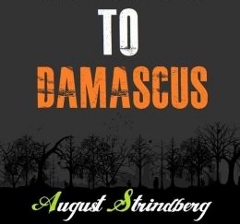
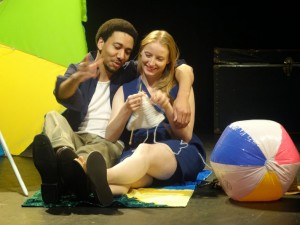
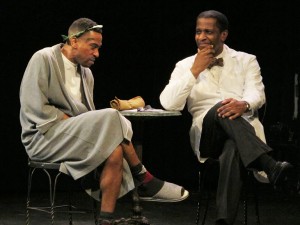
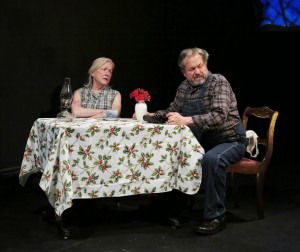
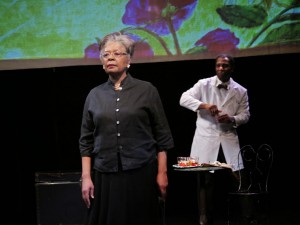
{ 1 comment… read it below or add one }
Agreed – except Victoria Blankenship (sp?) who did a great job as the Lady’s mother.